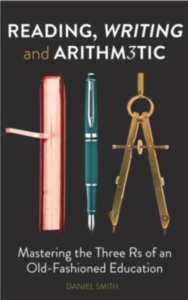I'm old enough that when I hear about the three Rs of education, I think about Reading, wRiting, and aRithmetic. At the start of the school year, however, one of my colleagues (Hi, CHF!) gave a talk about the three Cs of teaching and learning. Being a big fan of both the colleague and the letter C, I paid attention to his talk and wanted to share my version of and thoughts on what he said here.
His three Cs were CONTENT, CRAFT, and CURIOSITY. Yes, I thought, that's exactly what teachers need to aim for.
My guess is that many people who aren't in education think that a teacher's job is to relay her content to her students. This one is the given. Teachers have to understand the material and scaffold instruction so that their scholars can gradually go from knowing less about the topic to knowing more about it. This is the base level of my job.
To understand a subject more completely than what's going on, one must be able to discern how it's happening. In English, for example, it's not enough to read a novel and know what happens; my students must be able to notice and explain what literary techniques the book's author uses to create each effect. Further, my students should be able to use similar techniques to generate writing of their own. Once they can see the craft in writing, they will understand the words at a deeper level or on multiple levels.
But if my students cease their educations at what the words mean and how the author created that meaning, I haven't completed my job. The truly remarkable teachers inspire students to wonder about the why's. Why does this work of fiction matter? Students who keep thinking about the why's after they read a book will search for meaning and purpose in life. If we teachers can get our students to investigate their thoughts and feelings and those they encounter in the world around them, we have moved them toward having better lives. People who approach the world with curiosity are less judgmental, more thoughtful, and more fulfilled. [That last sentence reminded me of this wonderful clip from Ted Lasso.] If we teachers can reach this third level, after first teaching content and craft, then we win at teaching...and our students will win at living.
What do you think about adopting these three Cs? Is there a way to bring them into your life if you're not a teacher? Please share your responses in the comments.

I think a lot about advancing from the ‘what’ to the ‘how’ in sports. In sports, the ‘what’ are the outcomes and the results, like winning, or scoring a lot of points, for example. But when trying to improve your performance, worrying about the ‘what’ doesn’t help much, because the ‘what’ is only a result of the ‘how.’ Winning is a result of actions during the game. So, I advocate for focusing on the little things that can result in the ‘what.’ These should be actionable changes you can make, ie. the ‘how.’ Arriving at the ‘why’ is the most difficult part, but I see that as one’s motivation to implement the ‘how,’ to result in the ‘what.’ The ‘why’ is the reason for putting in all that effort in the first place. Relating back to education, you have to understand ‘how’ the author is relating the events happening in the work in order to ever be able to do that yourself. And to understand the author’s purpose or generate your own, you have to understand why the author wrote what they did.
Yes to all of this. Your discussion on athletics made me think about one of my current students. I asked about goals the kids have, and he wrote, “To make it to the hockey championship games.” I initially thought about how that goal is completely out of his control, so it seems a hard one, but I like your idea that the problem with his goal isn’t that he can’t make it happen alone but that it jumps past all of the whys and hows to one final what.
And while I have your attention, it seems to me that you should be thinking about WHAT you want to write in your WHY Wednesday guest post about HOW you think about the world.